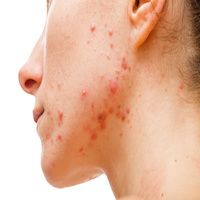Article
Study Finds No Link Between Acne Treatment Isotretinoin and Depression Risk
Author(s):
Researchers reported that treatment with isotretinoin is not only associated with significant clinical improvement in patients with moderate to severe acne, but it also did not cause worsening of depression or suicidal thoughts in any of the patients in the study.

Medications that successfully treat acne vulgaris have been linked in clinical research to increased risk of depression and suicidal ideation, raising the specter of a cure that can be worse than the disease. Now, a study in the Indian Journal of Dermatology suggests that one such medication, isotretinoin, is not only associated with a significant clinical improvement in moderate to severe acne, but also did not cause worsening of depression or suicidal thoughts in any of the patients in the study.
Isotretinoin, originally manufactured under the brand name Accutane, has been controversial since it was originally marketed more than 30 years ago. In 2005, isotretinoin was given an FDA black box warning for suicide, depression, aggression, and psychosis. And a wealth of clinical research, including a seminal 2012 clinical review published in the Journal of Clinical Psychology, concluded that isotretinoin was associated with depression and with suicide in a subgroup of vulnerable individuals.
But isotretinoin, a synthetic oral retinoid, has great efficacy in treating moderate-to-severe acne, and the definitive causal relationship between the medication and its potential psychiatric impacts has yet to be established.
The current study was an open-label prospective study involving 150 patients with Grade 2 to Grade 4 acne. Exclusion criteria included those who have had other forms of therapy for acne in the previous 4 weeks, past history or family history of psychiatric illnesses and/or treatment for the same, abnormal lipid profile, children less than 14 years of age, pregnancy and lactation. Women of child bearing potential were advised to follow strict contraceptive measures before being enrolled in the study. All patients included in the study underwent baseline investigations such as lipid profile, liver function tests, and a psychiatric evaluation. Depression scores were evaluated according to the "Hamilton Rating Scale for Depression" (HRSD-17 item scale) by a psychiatrist.
Patients were treated with 0.5 mg/kg/day for 3 months. All patients also received topical clindamycin 1% and adapalene 0.1%. Patients were evaluated every month for the first 3 months and then at 6 months. At each visit, acne and depression scoring was done with added observations on adverse effects.
Of the 150 patients included in the study, 143 patients completed the study. There were 94 males and 49 females, ranging in age from 15 years to 37. There was significant clinical improvement of acne vulgaris. Further, the Hamilton Rating Scale for Depression (HRSD) showed a significant reduction in depression scores from 3.89 ± 4.9 to 0.45 ± 1.12 (P < 0.001) at the end of 3 months. There was a further reduction at the end of 6 months at 0.18 ± 0.51 (P = <0.001).
The study authors suggested that some of the case reports, case series, and retrospective reviews linking depression to the medication may suffer from self-reporting of depression as opposed to objective measures of depression. “In our study, we found that the scoring for depression was higher prior to the onset of isotretinoin therapy,” the study authors note. “The scoring was found to decrease steadily during the treatment period and the reduction was found to be statistically significant at the end of three months of therapy. None of the patients developed worsening of their scores or suicidal thoughts during the 6 months of follow-up period.”
The researchers cautioned that large, randomized, prospective studies of longer duration are needed to further explore the risks of depression with isotretinoin.





